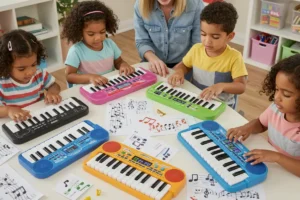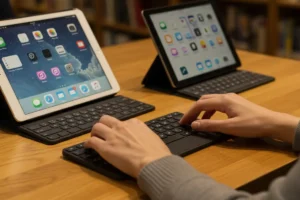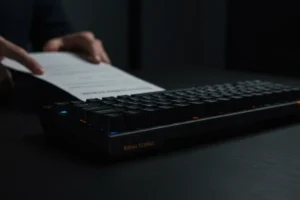So, how do you know which piano keyboard is the best for kids and young learners in 2025?
If you’re looking for a fun, educational, and frustration-free keyboard experience for your little one or someone just starting out, this article is your perfect guide.
I believe the best keyboard for kids isn’t just about sound quality or brand name—it’s about ease of use, durability, fun features, and helping beginners learn in a way that keeps them engaged.
I’ve put together this mega guide based on first-hand experience, countless reviews, and tips I’ve picked up as a total keyboard nerd.
I even dropped helpful links to sites like Wikipedia, my own blog Keyboards Technology, and other awesome pages to make your life easier. Oh, and if you want to see more posts like this, don’t forget to explore:
- The best keyboards for sound editing and music production
- Comparing the top keyboard brands
- How mechanical keyboards help reduce hand fatigue
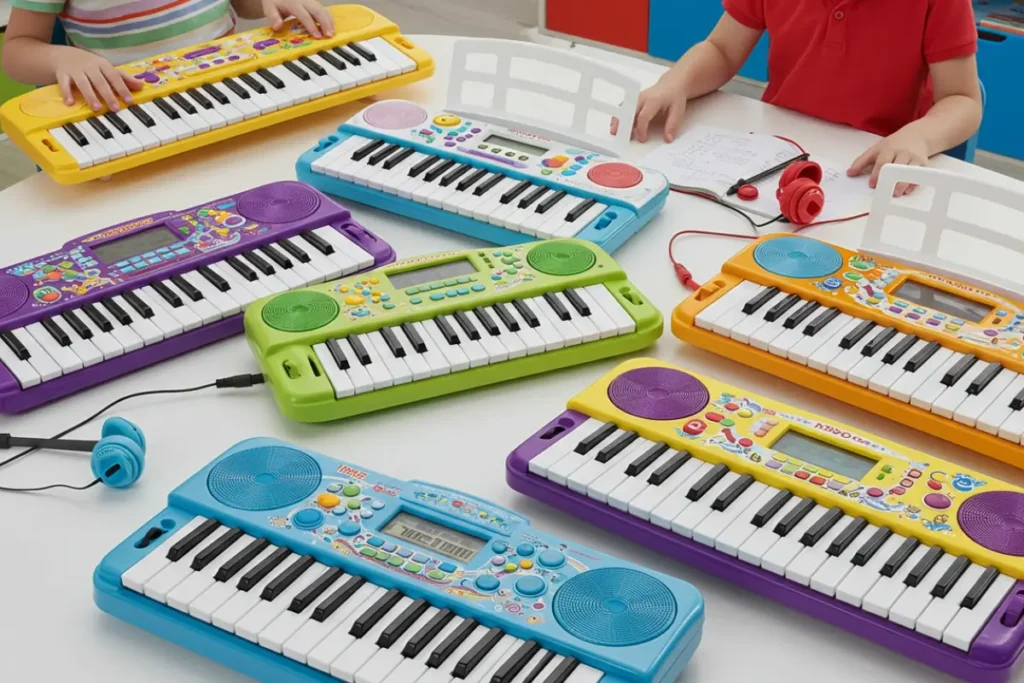
🧠 What Makes a Keyboard Good for Kids? (And Why I’m Super Picky About It)
Let’s be real—most kids don’t want a complicated, heavy keyboard with a million buttons they’ll never use. They want something that sounds good, feels fun, and helps them learn.
I’ve tested a bunch of models with my nieces and nephews (and okay, sometimes I hogged the keyboard myself), and here’s what I realized: not every beginner keyboard is made equal.
First off, size matters. Kids need something small enough to fit on their desks or play areas without needing to rearrange the whole living room.
That’s why 61-key and 49-key models are so popular—they’re big enough for learning but compact enough to store away easily.
Next up: simplicity. If you give a beginner a keyboard with 200 functions and 1,000 tones, they’ll probably just get overwhelmed.
What I like are models that have a few solid piano tones, some built-in rhythms, maybe a light-up key feature, and a simple metronome. Nothing crazy.
And let’s not forget about durability. These keyboards need to survive soda spills, sticky fingers, and the occasional “oops I dropped it” moment.
That’s why I recommend models with sturdy plastic shells, solid rubber feet, and lightweight builds that can take a beating.
Lastly, sound quality does matter, but it doesn’t have to be concert-hall quality. As long as the tones are clean, and there’s a headphone jack (because trust me, you’ll need quiet practice time), it’s perfect.
🧒 My Top Picks: Best Keyboards for Kids in 2025
I know you’re probably wondering, “Alright Erick, just give me the list!” So here it is—my personal picks for the best keyboards for young learners that won’t drive you or your child crazy. 😉
🎹 1. Yamaha PSS-F30
- 37 mini keys (perfect for small hands)
- Built-in songs, rhythms, and lessons
- Battery-powered and super portable
This one’s amazing for toddlers and little kids. I love how intuitive it is, and the sound quality is surprisingly solid for something so tiny. I always recommend it for kids around 4 to 7.
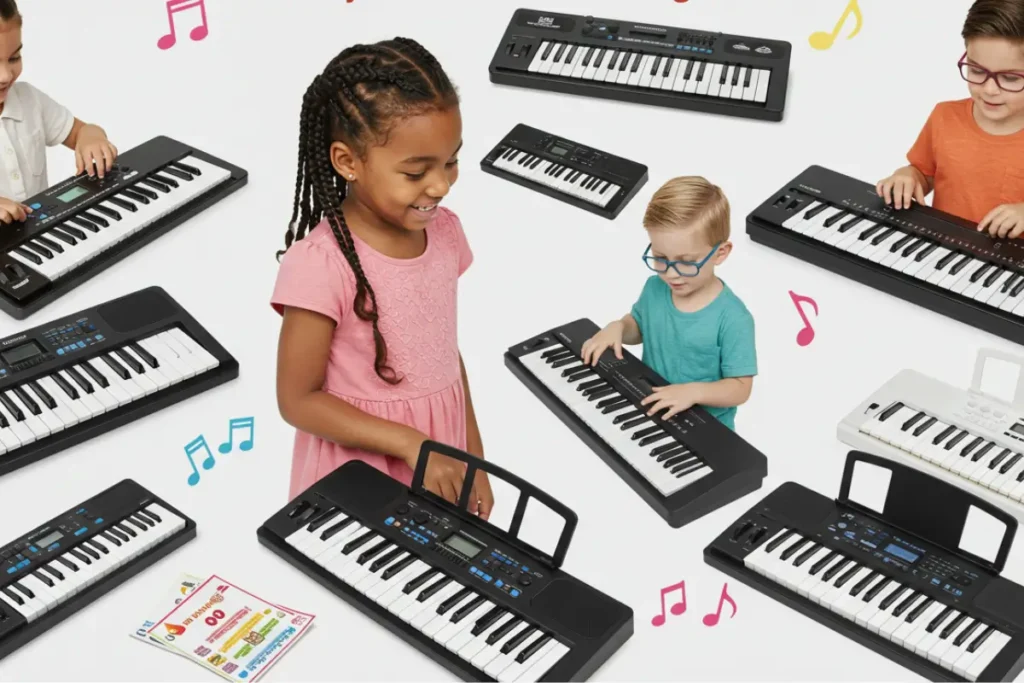
🎹 2. Casio SA-76
- 44 mini-size keys
- 100 tones, 50 rhythms, and 10 songs
- Clear LCD screen for easy navigation
This is a step up from the Yamaha in terms of features but still very beginner-friendly. I’ve seen kids light up when using the drum pad and sound effect buttons. Super fun, zero frustration.
🎹 3. Alesis Harmony 61
- Full 61 keys
- Includes stand, stool, headphones, and microphone
- Tons of built-in lessons
This is perfect if you want something that’ll grow with your child. It feels more “real” and is great for kids aged 8 and up. It’s more like a full learning station than just a toy.
🎹 4. Roland GO:KEYS 61
- Bluetooth connectivity
- Loop mix for creativity
- Professional-level sound engine
This one is a little more advanced and a bit pricier, but I swear by it for older kids or teens who are really into music. It encourages creativity and feels more like a legit instrument than a toy.
🎯 What Features to Look For in a Beginner Keyboard
If you’re not sure how to choose the right keyboard, don’t worry—I got you. Here’s a checklist I personally use when helping people find the perfect beginner board:
✅ Beginner Keyboard Feature Checklist:
- Mini or standard-sized keys depending on age
- Headphone jack for quiet practice time
- Built-in lessons or light-up keys for learning
- Recording capability (even basic ones!)
- Rhythms and demo songs for fun
- Portability: lightweight and maybe battery-powered
- Durability: tough enough for kid use
I’d also recommend something that includes USB connectivity so you can hook it up to a tablet or computer for online lessons. By the way, I wrote more about tablet keyboards right here: Keyboards for Tablets
Oh—and one last pro tip: avoid overly flashy RGB models unless they’re functional. I know lights are cool, but for beginners, they can be a distraction.
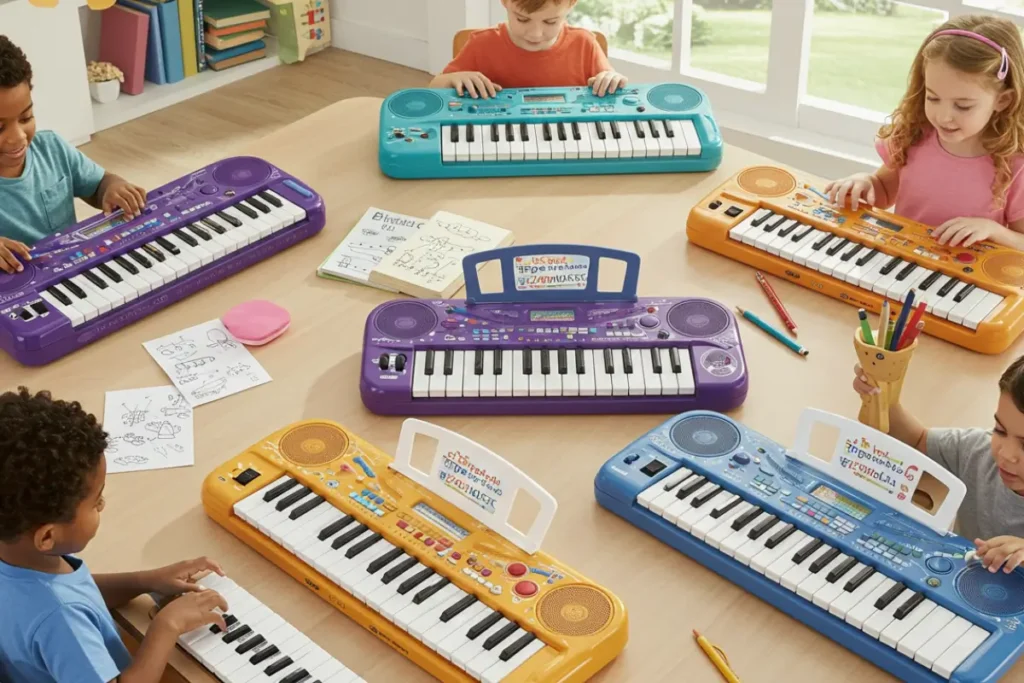
🔄 How to Make Piano Practice Fun for Kids
One of the biggest mistakes I’ve seen parents make is forcing music practice like it’s homework. Learning music should be a game, a discovery, a party! 🎉
Here are a few of my favorite tricks:
- Gamify the practice. Use apps like Simply Piano or Synthesia.
- Celebrate small wins. Clap after each song like they just won a Grammy.
- Join them. Learn a silly song together and perform for the family.
- Use the keyboard’s built-in games (some come with mini challenges!)
Trust me, when kids feel like they’re playing instead of learning, they stick with it longer—and end up falling in love with music for life. If you’ve got any personal tips, please drop them in the comments. I’d love to hear them.
See More
- Best Piano Keyboards for Kids and Young Learners
- Typing on the Go: Top Keyboards for iPad and Android Tablets
- Royal Kludge Keyboards: Are They Still Worth It in 2025?
🏁 Final Thoughts: Let’s Make Music Fun (and Easy!)
To wrap this up, I just want to say this: music should feel like magic—not a chore. When kids fall in love with learning, they stay curious, creative, and confident.
And as someone who lives and breathes all things keyboard, I truly believe it all starts with the right first instrument.
Whether it’s a small Yamaha, a fun Casio, or a full-featured Roland, there’s something out there that will fit perfectly in your little musician’s hands.
And if you’re still unsure, remember: I’m here to help. Drop a comment, share your story, or ask questions—this blog isn’t just mine, it’s ours. 💬
👉 If you liked this article, don’t forget to share it, comment what keyboard your kid is using, and explore more epic content on Keyboards Technology.
And hey, if you’re curious, check out a full breakdown of gaming keyboards ranked from budget to pro and see why I love exploring all types of keyboards, not just for music!
🎮 Join Our Discord Community!
Are you passionate about keyboards, gaming, and tech? Come hang out with fellow enthusiasts, ask questions, share your setup, and stay updated with our latest content!
👉 Join Now